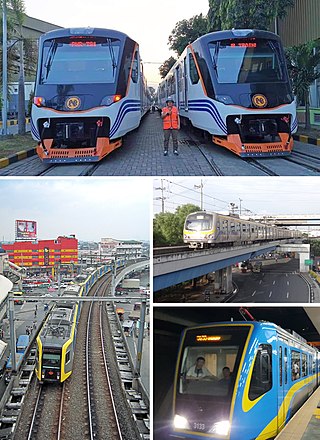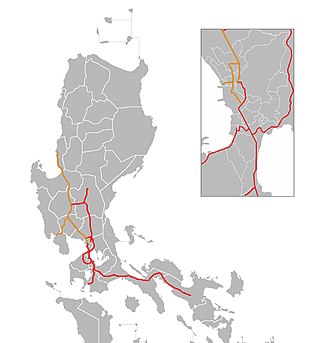
Clark International Airport, known as Diosdado Macapagal International Airport from 2003 to 2014, is an international airport covering portions of the cities of Angeles and Mabalacat within the Clark Freeport Zone in the province of Pampanga, Philippines. It is located 80 kilometers (50 mi) northwest of Manila. It is accessible by way of the Subic–Clark–Tarlac Expressway (SCTEX).

Capas, officially the Municipality of Capas, is a 1st class municipality in the province of Tarlac, Philippines, and one of the richest towns in the province. The town also consists of numerous subdivisions and exclusive villages.

Rail transportation in the Philippines is currently used mostly to transport passengers within Metro Manila and provinces of Laguna and Quezon, as well as a commuter service in the Bicol Region. Freight transport services once operated in the country, but these services were halted. However, there are plans to restore old freight services and build new lines. From a peak of 1,100 kilometers (680 mi), the country currently has a railway footprint of 533.14 kilometers (331.28 mi), of which only 129.85 kilometers (80.69 mi) are operational as of 2024, including all the urban rail lines. World War II, natural calamities, underspending, and neglect have all contributed to the decline of the Philippine railway network. In the 2019 Global Competitiveness Report, the Philippines has the lowest efficiency score among other Asian countries in terms of efficiency of train services, receiving a score of 2.4, and ranking 86th out of 101 countries globally. The government is currently expanding the railway network up to 1,900 kilometers (1,200 mi) by 2022 through numerous projects.

Bonifacio Global City is a financial business district in Taguig, Metro Manila, Philippines. It is located 11 kilometers (6.8 mi) southeast of the capital city of Manila. The district experienced commercial growth following the sale of a 440 ha military base at Fort Bonifacio by the Bases Conversion and Development Authority (BCDA). The entire district used to be the part of the main Philippine Army camp.

The Subic–Clark–Tarlac Expressway (SCTEX), signed as E1 and E4 of the Philippine expressway network, is a controlled-access toll expressway in the Central Luzon region of the Philippines. From its northern terminus in Tarlac City to its southern terminus at Tipo in Hermosa, Bataan, the SCTEX serves as one of the main expressways in Luzon. The expressway is also connected to the Central Luzon Link Expressway, North Luzon Expressway, Tarlac–Pangasinan–La Union Expressway, and the Subic Freeport Expressway. The SCTEX is the country's longest expressway at 93.77 kilometers (58.27 mi) until the completion of Toll Road 4 of South Luzon Expressway (SLEX). The Subic–Clark–Tarlac Expressway was constructed to provide a more efficient transport corridor between Subic Bay Freeport, Clark, and the Central Techno Park in Tarlac, foster development on the municipalities served, and connect major infrastructures such as the Subic Seaport and Clark International Airport.

The Tarlac–Pangasinan–La Union Expressway (TPLEX), signed as E1 of the Philippine expressway network and R-8 of the Metro Manila arterial road network, is a controlled-access toll expressway that connects the Central Luzon region with the Ilocos Region. From its northern terminus at Rosario in La Union to its southern terminus at Tarlac City, the expressway has a length of 89.21-kilometer (55.43 mi), cutting through the various provinces in northern Central Luzon. The expressway also passes Nueva Ecija between Tarlac and Pangasinan, only that it is not included on the expressway's name because there are no exits to directly serve the province although the exits indirectly serving it are Victoria, Pura, and Anao which are located in Tarlac.

Clark, officially known as the Clark Freeport and Special Economic Zone (CFEZ), refers to an area in Central Luzon, Philippines.

The Bases Conversion and Development Authority is a government-owned and controlled corporation under the Office of the President of the Philippines. It is a government instrumentality vested with corporate powers under Republic Act 7227, signed into law by former President Corazon C. Aquino on March 13, 1992. The BCDA Charter was as amended by RA 7917 in 1995, and further amended by RA 9400 in 2007. The corporation is mandated to transform former US military bases into alternative productive civilian use.

New Clark City is a planned community currently undergoing development, located within the Clark Special Economic Zone in the towns of Bamban and Capas in Tarlac province, Philippines. It has an area of approximately 9,450 hectares and will accommodate up to 1.2 million people. It is owned and managed by the Bases Conversion and Development Authority (BCDA).

The New Clark City Sports Hub or the New Clark City Sports Complex is a complex of sports facilities located inside the National Government Administrative Center of New Clark City in Capas, Tarlac.

Expressway 1 (E1) forms part of the Philippine expressway network. It runs through western Luzon from Quezon City in the south to Rosario in the north.
The Metro Rail Transit Line 8, or MRT-8, also known as PNR East-West Line, is a proposed rapid transit line in the Philippines. It would be a 9-kilometer (5.6 mi) railway system connecting Sampaloc, Manila and Diliman, Quezon City via Commonwealth Avenue, Quezon Avenue, and España Boulevard.

The North–South Commuter Railway (NSCR), also known as the Clark–Calamba Railway, is a 147-kilometer (91-mile) urban rail transit system under construction in the island of Luzon in the Philippines. Running from New Clark City in Capas to Calamba, Laguna with 36 stations and four services, the railway is designed to improve connectivity within the Greater Manila Area, and it will be integrated with the railway network in the region.

New Clark City Aquatic Center is a swimming and diving venue at the New Clark City in Capas, Tarlac, Philippines. It is one of the venues of the New Clark City Sports Hub, which is part of the National Government Administrative Center. It hosted the aquatics events of the 2019 Southeast Asian Games and is set to host the 2023 Asian Swimming Championships.

The New Clark City Athletics Stadium, also referred to as the New Clark Stadium, is a multi-purpose stadium located at the New Clark City in Capas, Tarlac, Philippines. It is the primary venue of the New Clark City Sports Hub, which is part of the National Government Administrative Center. It hosted the athletics events and the closing ceremony of the 2019 Southeast Asian Games.
The COVID-19 pandemic in Central Luzon is part of the worldwide pandemic of coronavirus disease 2019 caused by severe acute respiratory syndrome coronavirus 2. The virus reached Central Luzon on March 9, 2020, when the first case of the disease was confirmed in San Jose del Monte. All provinces in the region have recorded COVID-19 cases. As of August 14, 2022. Central Luzon has 376,747 cases with 6,995 deaths.

Mega Ligtas COVID Centers, also known as Temporary Treatment and Monitoring Facilities (TTMFs), are temporary non-hospital health facilities or emergency patient care centers established and managed by the Philippine government to accommodate COVID-19 patients at a provincial or regional level as part of its efforts to deal with the COVID-19 pandemic in the Philippines. Some facilities are also serving as quarantine sites for Filipino repatriates from other countries.

Vivencio "Vince" Bringas Dizon is a Filipino economist, consultant and political aide who previously served as president and CEO of the Bases Conversion and Development Authority. He also served as President Rodrigo Duterte's Adviser on Flagship Programs and Projects and as Deputy Chief Implementer of the National Action Plan Against COVID-19.
Andres "Andy" David Lacson is a Filipino politician. He was a mayor of Concepcion, Tarlac and Vice Chairman of Aksyon Demokratiko.


















